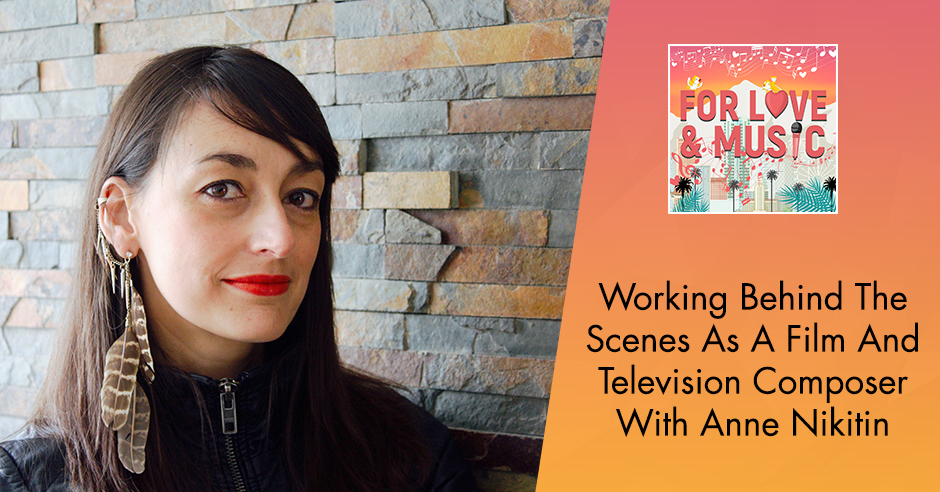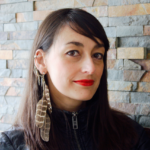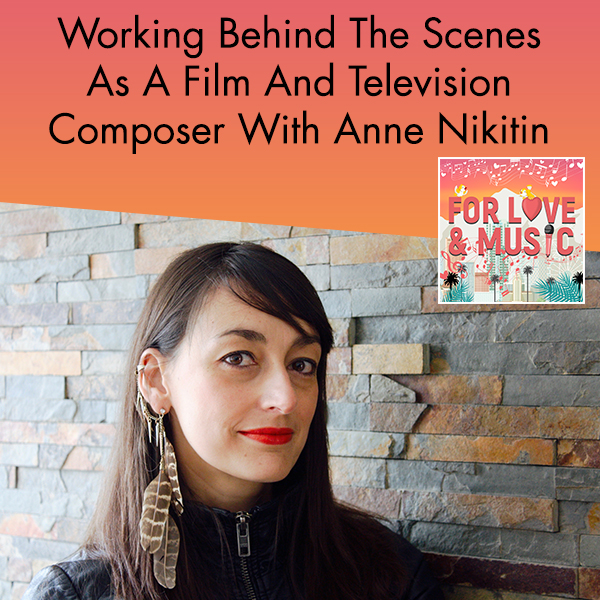
Music is an art of expressing one’s emotions and essence that impacts the listener’s emotions. Join Tara Joseph as she gets to know film and television composer Anne Nikitin. In this episode, Anne walks us through how she found herself as a film composer and how she scored the BAFTA-winning Film, The Imposter, while also sharing life-changing stories of working with directors and receiving awards. Recently, she got to score Netflix’s Fate: The Winx Saga. She mentions those she has worked with who have influenced her and made it easier to navigate her chosen path. So take a listen to this conversation from LA to the UK.
—
Listen to the podcast here:
Working Behind The Scenes As A Film And Television Composer
With Special Guest, Emmy Nominated, And Ivor Novello Nominated Composer, Anne Nikitin
I’ve got another fantastic guest, an Ivor Novello, Emmy-nominated composer, and Classic FM’s 2018 composer to watch. Let’s welcome to the show, Anne Nikitin. Anne, how are you?
I’m good. Thank you. Thanks for having me.
Where are you? I always love to ask my guests where you’re situated.
I am in North London and in my attic studio. I’ve been in here for a long time. I work here anyway, but I feel confined to this space now.
How have you found being creative in forced isolation or has it not felt very different?
It hasn’t felt different. It’s felt a little bit more hectic because I’m used to working here. I’m used to being at home and composing music, but I’m not used to having the family around. I’ve got two young children. Balancing work with homeschooling, staying safe, and trying to stay physical has been a bit of a challenge.
It’s terribly nice to hear another British accent.
I’m not British. I’m Canadian. We traveled a lot. I went to the British School in The Netherlands when I was ten and I moved here. I feel British.
Where in North London are you?
East Finchley.
I’ve got friends that live in East Finchley. I’m missing the UK. Because of COVID, I haven’t been able to come back since last February 2020. I’m desperate for a trip as soon as possible.
Are you in LA?
I’m in LA and I’ve lived here for many years. Take us back to the beginning. You are an incredibly successful composer. How did it all begin? Were you a very musical child? Fill us in on how it started.

I was. I always loved music. I was obsessed with the charts, music around the house, and whatever my parents were playing. I always made my own instruments and try to write music when I was very little and didn’t know what notation was. I went on to study music at university. I studied Contemporary Classical Composition and orchestra trained. I decided as much as I loved that avant-garde world, I love to film music. I wanted to write a melody. I got into the Royal College of Music in London and they had one of the few Film Music courses there. That was a great experience. I thought I’ll pull into my dream job as soon as I graduate.
Sadly, it was a lot harder than that. It took me quite a long many years to get my first paid job where I could finally quit my dream job. I quit my day job for my dream job. That was through a very random experience where I saw that BBC was running a competition to find a new TV composer. I entered that, not thinking anything of it. I ended up winning that. It was life-changing because the commission was to score an episode of BBC Network, which was my dream job. I’ve never written for television and the director was wonderful. He held my hand through the whole process and explained what a pre-mix was and a final mix and all of that. I’m internally grateful for the team that runs that at the BBC. It snowballed from there and that wonderful composer who helped me get the jobs that he couldn’t do because he was too busy. I met lots of directors and producers.
When you were a youngster, were you influenced by specific kinds of music? You had this break and won the New Composers Competition for the BBC. Leading to that point, had you been influenced by certain other composers or music? How did that happen?
In terms of filming, I paid attention to film music for the first time when the film The Piano came out. Music is fitting for the character. It was the first time I went, “This is wonderful. Maybe I should do something like this.” I’d always loved film music, John Williams, and all those films were incredible, but they would seem unattainable to me and not something I ever thought I would do. Whereas when I saw The Piano, I thought, “I play the piano and I love to write tunes, maybe this is something that I can consider.” I grew up listening to a whole bunch of different music and my mom loved classical music. My dad was a big jazz freak and I loved my ‘80s pop music and then my ‘90s grunge.
You’re a bit of The Cure fan, weren’t you?
I was. It’s lovely to meet The Cure.
I was The Cure and the Smiths. Robert Smith, what a legend. He’s still going strong. He still got the same look as far as I’m aware.
I’ve seen them probably more recently than I did back in the day, and they are incredible in live. They’re getting rockier and harder. It’s brilliant and full of energy.
It’s a bit like The Stones. The longer they keep going, the rockier they get and the more brilliant they get live. I hope I’ve got that much energy when I’m 75. You score The Winx Saga for Netflix. I was lucky enough to see some of those episodes and it’s such a great show. I got into it. I was also a bit of a fan of The Vampire Diaries because Brian Young curated both The Winx Saga and The Vampire Diaries. How did that opportunity come for you? What a great gig to get. It’s fab music. Your music holds the whole show together.
I loved the show and I’m excited for it to come out. I landed the job because I’d worked with the music supervisor before, Matt Biffa. He recommended me to Brian. I hopped on the phone with Brian and we hit it off. We shared the same vision for his creation. I sent him some tracks that I’d written without having seen anything based on the brief he’d given me, any light to them. It was quite a long process. I was on that for about a year and there was a little bit of a pause when locked down happened, but not much. It was quite an intensive experience, but it was a joyful experience because Brian, Judy, the producer, and Matt were a brilliant team to work with. I couldn’t have asked for a better group of people.
When you walk on a project like that, with this, you said it took around a year, but how long does it usually take to score a project?
Every project is different and I’ve been on a feature doc for a whole year, which is very unusual then I’ve been on them for three full weeks. This was quite an intense series, the six episodes. There was a lot of back and forth with episode one that took quite a lot of time to get right in the edit as well as with the music. We had lots of people to satisfy with that episode, but as soon as that one was out of the door, it sped up and it was a much quick episode and then they needed time for visual effects and sound design and everything. It was quite a long post-production process, but it gave me time to write music that I was quite proud of because I had that time. Sometimes when you’re rushed, you’re trying to batch things out that work. Whereas, we spent a lot of time talking about the music and trying different things. I was pleased that the temp music was never working and nobody liked it. I felt like I had a clean slate and then I had all this time to experiment with Brian and Judy. I make sure everyone was happy, including me, which is nice.
When you are a composer, you don't sleep much, and that's just the way it is Click To TweetDid you create everything from the studio you’re in?
Yeah, I did. Technology now is incredible.
Are you a multi-instrumentalist?
No. I play piano and guitar very badly. I hate performing. I have an aversion to it. I play a lot of things badly and I do like to tinker with things and get sounds out of them, but no, I wouldn’t say I’m an incredible player.
For those people reading who may want to become composers in the world of TV and film, what advice would you give them and what do they need as their starting tools? I can see you through the technology of Zoom, sitting in your fabulous studio. I can see computers and various other things. What would you suggest are some essential things you need to get going if you’re on a tight budget?
When I started, I’d met my lovely friend through the competition, who is a seasoned composer. I was pitching for one of my shows after that. I played it to him and he said, “Your samples are awful. I know you don’t have any money, but you’ve got to invest in getting good orchestral samples.” Luckily, most samples these days are much better than what I had many years ago. Invest in some good samples, the orchestra, and whatever the synth that you like to use. What helped me a lot was getting ready for that first commission. I had practiced on a lot of short films and I was doing one short film after another. I had a day job, but I spent all my evenings and nights trying to get short films done, meeting deadlines, and working with directors. That gave me a great experience of working with people in a collaborative way. Also, understanding that you don’t sleep much when you are a composer and that’s the way it is.
Is that because you’re incredibly busy or because your mind doesn’t switch off?
Both. It’s mostly because deadlines are always there and it doesn’t matter how much time you have to prepare, that always seems to be a rush at the end to get the music done and out of the door. The recording is a whole other process that because you’ve written the music, it doesn’t mean you’ve finished. You’ve now got to record it. That takes a lot of time and sometimes almost as long as it takes to write the score. There’s a lot to do to have that piece of music ready to send to the dub, to put onto the film. Everyone will tell you that you don’t sleep leading up to a dub, no matter how prepared you are.
Are your children musical?
I’m finding that they’re starting to be. They’re 6 and 9. The nine-year-old is more of an artist to visual. I don’t know where she gets that from. The little ones are starting to love music. It’s fun and they love coming to my studio.
You’ll be sharing your studio before you know what’s happened. Let’s also talk about some of your other successes. You scored for the heist movie American Animals, the BAFTA-winning film, The Imposter, Little Birds, which was a sky drama, and the list goes on. What would you say you’re most proud of?
I love all the ones you’ve listed. Those are some of my favorites. I worked with Bart Layton, the director of The Imposter and American Animals. I love his films, they’re brilliant and he’s great to work with. I’m proud of the scores that I’ve created for those two films. He ended up both with so much fun. It’s a real bonkers series. I believe it’s coming to the States in February 2021. That was a joy because it’s crazy. It’s this strange erotic, tragic comedy with some brilliant actors. The director was to write something bonkers and she gave me quite a lot of freedom to do that.
That must’ve been fun?
It was good because sometimes you get bound to temp music or guide music. It can be a little bit soul-destroying if a director is incredibly attached to temp music, somebody else’s score and you think, “Why can’t you like my music?” You have to try and navigate through that hurdle. On these recent ones, it’s been great like little birds, but there hasn’t been much temp music that was working and a similar fate. You feel like you can use your own voice.
Are there certain directors that you haven’t worked with yet that you would love to work with?
Yes, there are awesome, but you think I’ll never get to work with them, like Steven Soderbergh and people like that. Also, Ridley Scott, I loved his films. Maybe one day.
You’ve already worked with some such incredible people that I would say the sky is the limit. Over the next few years, if you could plot out your five-year game plan, what would it be? Steven Soderbergh, I suppose?
I’d like to keep going. I’m enjoying what I’m doing now. I started off in documentaries and docudramas for a lot of US channels. I loved that. I’m moving more into drama now and I’m enjoying that too. I’d like to do more bigger films, I suppose. I feel lucky to be in the profession, to begin with and to be able to earn a living, doing what I love every day, as much as I am about being tired. That’s what I admired.
You mentioned that you are part Romanian and part Polish. Were your parents musical?
I don’t know. They love music. My dad loved jazz and they always had music around. If they’d been given the opportunity to have music lessons or whatever, they probably would have been musical. Weirdly, it’s strange you ask, my dad’s mom, a Polish lady who I’d never met, she died before I was born, but she played music silent piano for silent movies in Poland. I thought that was a very odd link. That’s how she met my grandfather. He worked in a cinema. There’s someone in the genes.

The show is called For Love And Music. I called it that because those are the two reasons I moved to LA. I sometimes like to ask people, is there a song that resonates romantically with you that has a special place in your heart?
There are many, but Just Like Heaven by The Cure jumps to mind. It was the song that sums up my teenage years that I still love when I hear it. Is that what you mean?
Yeah. It could be anything.
Anything of Disintegration as well.
Has love ever helped you make an unexpected decision in your career? It doesn’t have to be yes. It can be a straightforward no.
I met my partner through working with him. I suppose that’s something.
You also mentioned that you went to the Royal College of Music. Tell us a little bit about that experience because it’s what an incredible educational facility to be a part of.
It was. I had to shake myself when I got into college. They didn’t accept many people into the Master’s program and it was brilliant to be in that environment, surrounded by incredible performers, musicians, all students, melting part of amazing talent and also steeped in history. Right across from the Royal Albert Hall, it was a beautiful building to be able to go to every day. The course is fantastic. I learned so much practical advice as well as making friends and connections. What was special about it is that they would have a guest composer come in every week.
I always remember that and it’s something to look forward to because as much as you’re doing it, it’s all quite academic until you meet the composers that are in that world. Everybody wanted to know how did they break in, what are the practicalities of being a film and TV composer. Listening to them speak was always fascinating. They always had a different story and sometimes they did workshops with us. We had incredible guests like Gabriel Yared who would come and then do workshops with us. We got to see how they worked and then went on to befriend them and it was good.
Are you still in touch with some of your friends from college?
We were close during that whole time, but we drifted now.
Do you feel that your Romanian and Polish heritage has played an influence on the music that you create?
I do. I’ve often thought of that. I think there’s a real delicateness to my music and I do love folk music. My mom was always playing Romanian folk music in the house. That seeped into me. The Polish are known for being quite dark with their music. That seeped in there somewhere.
No matter what, you have to try and navigate through that hurdle Click To TweetIt’s been such a joy chatting with you. I encourage everyone to watch The Winx Saga on Netflix because it’s good and the characters are great. I want to rush off and go to the fairy academy. I was trying to work out when I was watching it which skill I wanted.
You’ve got to pick your favorite fairy. My girls are still wondering who their favorite is.
It would be quite nice to know the girl who has the mental ability, but then I’m like, “That would be exhausting.” Your music throughout is wonderful. Many congratulations. It’s been wonderful speaking to you. Thank you so much for coming on the show.
It’s lovely to speak to you as well. Thank you.
To all of our readers, I hope you’re staying safe and healthy out there.
Important Links:
About Anne Nikitin
 Anne Nikitin is an Ivor Novello and Emmy-nominated composer, best known for her work on Bart Layton’s critically acclaimed heist movie AMERICAN ANIMALS and BAFTA-winning film THE IMPOSTER. She was named Classic FM 2018 “Composer to Watch” and a “composer who should be on your radar” by Film4.
Anne Nikitin is an Ivor Novello and Emmy-nominated composer, best known for her work on Bart Layton’s critically acclaimed heist movie AMERICAN ANIMALS and BAFTA-winning film THE IMPOSTER. She was named Classic FM 2018 “Composer to Watch” and a “composer who should be on your radar” by Film4.
Nikitin’s latest project is FATE: THE WINX SAGA, a young adult fantasy series for Netflix created by Brian Young (The Vampire Diaries).
Other recent projects include LITTLE BIRDS, a Sky Drama series based on the erotic stories of Anaïs Nin starring Juno Temple and Hugh Skinner; the family fantasy movie FOUR KIDS AND IT based on Jacqueline Wilson’s novel starring Sir Michael Caine, Russell Brand, Matthew Goode, and Paula Patton; and SOULMATES, an anthology series for AMC created by William Bridges (Black Mirror, Stranger Things).
Her diverse body of work includes Agatha Christie’s THE PALE HORSE, for BBC/Amazon Prime starring Rufus Sewell, nominated for a Music+Sound Award; LOST GIRLS, a Netflix movie starring Amy Ryan, Gabriel Byrne and Dean Winters; UNTOUCHABLE: THE RISE AND FALL OF HARVEY WEINSTEIN nominated for two Emmys; and STARDUST, a road-trip movie about a young David Bowie starring Johnny Flynn, with whom she co-composed part of the score.
Anne enjoys writing in a variety of styles but has an affinity for dark, moody, atmospheric music, growing up on heavy doses of bands such as The Cure, Sonic Youth and Radiohead, as well as contemporary artists ranging from Björk to Arvo Pärt, and avant-garde composers such as György Ligeti and Iannis Xenakis. From sweeping orchestral scores to dirty guitars, mesmeric synths and delicate piano refrains, she creates unique sound worlds spanning a wide range of genres.
Anne was born in Canada to Romanian and Polish parents and grew up in various countries around the world. She immersed herself in books, films, and avant-garde music while studying Composition and English Literature at McGill University in Montreal, and was awarded a SOCAN prize for Young Composers of Canada. She completed her Master’s in Composition for Screen at the Royal College of Music in London where she studied with Dario Marianelli, Gabriel Yared, and assisted George Fenton. Her lucky break came in 2006, when she won the BBC New Talent, New TV Composers scheme and went on to compose scores for major UK and US broadcasters.
Anne is a voting member of BAFTA, The Ivors, and The Academy of Motion Pictures.
Join the For Love and Music Community today:

